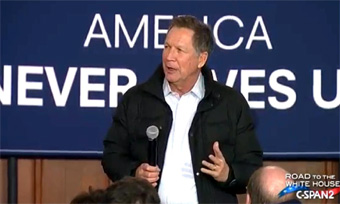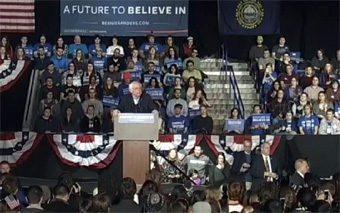
Ohio Governor John Kasich at a campaign event in
New Hampshire on Monday; image courtesy of C-Span
New Hampshire Outcome Hours Away
| published February 9, 2016 |
By R. Alan Clanton, Thursday Review editor
Voters in New Hampshire go to the polls today to take the U.S. Presidential election to the next stage—the first results from a primary vote. Candidates for both parties have been campaigning hard in the state, where both Democrats and Republicans—along with thousands of independent voters—will choose between dozens of candidates.
On the Democratic side, Vermont Senator Bernie Sanders still maintains a substantial double-digit lead over former Secretary of State Hillary Clinton, despite a robust effort by the Clinton campaign and the entire Clinton family to close that gap before the polls close in the Granite State. Hillary Clinton, husband Bill, daughter Chelsea, and a host of high-profile Clinton friends and allies, have been canvassing every corner of the state in search of undecided voters, and in an effort to pull support away from the surging Sanders. Though it is unlikely that Clinton can pull off a win in New Hampshire, her campaign team hopes to avoid a big loss in a state that could serve as an important bellwether of how independent voters may vote in the fall.
The New Hampshire primary comes just one week after the Iowa caucuses, which produced no decisive victory, but nudged Sanders’ to within striking distance of Clinton, who has maintained a solid lead over the Vermont Senator for many months. Clinton and Sander battled to a virtual tie in the Iowa caucus last Monday, splitting the votes evenly and dividing the delegate count almost down the middle. Though Clinton was declared the winner, Sanders declared a moral victory for the tie, a razor-thin outcome in which a half dozen caucus sites were decided by a coin toss.
The virtual tie boosted Sanders’ campaign efforts, sparked a new round of additional donations to his coffers, and brought more young volunteers to his cause. Clinton claimed a well-deserved victory, breathed a sigh of relief, and said it was time to move on, where her campaign strategists still see her winning easily in the weeks and months ahead as voters in South Carolina, Nevada, a dozen Super Tuesday states, and Florida cast their votes in upcoming primaries and caucuses.
On the Republican side, New Hampshire could very well extend a fluid and uncertain race well into the months ahead. Longtime GOP front runner Donald Trump maintains a hefty lead in the Granite State—more or less the same lead he has held for months—but the fight for second, third and fourth places remains a critical and perhaps all-important test of the strength of the so-called establishment and mainstream voters within the GOP.
Iowa produced a big win for Texas Senator Ted Cruz, who stormed past the other candidates to take a solid first place. Iowa also tossed Trump into second place, and produced a surprisingly strong third place finish for Florida Senator Marco Rubio, who came within one point of besting Trump. With Cruz the apparent chief rival to Trump—especially for the anti-establishment and anti-Washington vote—Rubio became overnight the rising star, and the candidate seen as most likely to wrestle the coveted third place prize from the still crowded field.
But on Saturday, Rubio had what most political observers consider his worst debate performance to date. The polished and usually gifted orator and debater, and the one who has risen steadily from single to double digit polling largely due to his commanding and solid showings in the debates last year, seemed off his game at a GOP debate hosted by ABC News over the weekend. That setback—coupled with strong performances by the remaining governors in the field (former Florida Governor Jeb Bush, Ohio Governor John Kasich, and New Jersey Governor Chris Christie)—immediately rebooted the field, and may have hindered Rubio’s goal of getting undecided or wavering Republicans to rally around his campaign and its themes.
The result has been a levelled playing field between Rubio, Bush, Kasich, Christie and Cruz, and the likelihood that no clear challenger will emerge to the outsider Trump (or to the anti-establishment surge of Cruz himself).
But savvy political analysts point out that one important aspect of New Hampshire’s voting is the relative unpredictability of the electorate there. Granite State voters are famously slow to make up their minds, and current polls—for both parties—still show a substantial number of voters will not make up their minds until they get to their polling places today and tonight. The result could be wildly expected outcomes on both sides, and for several candidates. Bush and Kasich, especially, hope to rally independent-minded voters to their more moderate and traditional appeals. Both candidates have seen modest surges in their support. Christie, too, hopes for a surprise coming out of New Hampshire. Though he has struggled to remain relevant over the last few months in polling, the New Jersey Governor was seen as one of the strongest performers in last weekend’s debate in Manchester.
Trump remains the front runner despite the fluid and rapidly-changing battles for second and third place. Barring a surprise, he is expected to do well in the New Hampshire primary , a state where he has led in polls for months.
Meanwhile, Hillary Clinton is facing a swirl of rumors and media reports that she and husband Bill Clinton are on the verge of a massive shake-up of her top campaign staff and its apparatus. Nationally, Sanders has closed the once-formidable gap with Clinton, and in several major polls is within one or two points—a sign of trouble for the once-presumed front-runner and standard bearer of the Democratic Party. Clinton has already addressed the question on Monday in a conversation with MSNBC’s Rachel Maddow. In that interview, the former Secretary of State said that she and Bill would “take stock” of the situation at the end of the day in New Hampshire, but that no major shake-up was in the works.
But more reports, several from Clinton insiders, suggest that Hillary Clinton was understating the plan for a major reboot of the campaign; reports from those close to the Clintons but not on her top staff say that Bill has advocated firing several top campaign strategists and planners, and has lobbied hard for a major shake-up and reorganization among the command positions.
“We’re going to take stock,” Clinton reiterated to Maddow, “…what works…what doesn’t work. We’re moving to a different phase of the campaign…we’re moving into a more diverse electorate…we’re moving into different geographic areas. So, of course, it would be malpractice not to say ‘OK, what worked? What can we do better?’”
Several of the media reports suggest that while there is no widespread panic within the top echelons of her campaign, there is deep concern that the longer the primary and caucus process drags out this spring, the greater the risk to Clinton’s nomination. Those close to the Clinton’s say that husband Bill’s growing anger is sparking a serious conversation about how the campaign is being guided and managed—mostly out of fear that if certain things are not fixed quickly, Clinton could face even more challenging terrain when she gets to Super Tuesday.

Vermont Senator Bernie Sanders at a rally at the University of New Hampshire;
image courtesy of C-Span
To complicate matters, more talk of a Biden candidacy has surfaced. Though the vice-President has been clear that he does not intend to enter the race for the Democratic nomination, new rumors have swirled in the last week that some top fundraisers are discussing nudging him into the race by demonstrating that he still has the power to raise cash quickly. Emails and social media messages were making the rounds starting Friday, many of them urging potential Biden supporters to be prepared for a possible last-minute Biden candidacy.
Those emails, authored by several former Biden fundraisers and bundlers, cited new polls suggesting that a dead heat between Clinton and Sanders revealed potential divisions within the party, and touted newer polls which seem to indicate the difficultly that either Clinton or Sanders would face against several potential Republican nominees.
Related Thursday Review articles:
ABC News Republican Debate: A Good Night for the Governors; A Bad Night for Rubio; R. Alan Clanton; Thursday Review; February 7, 2016.
Wall Street Takes Center Stage in Democratic Debate; R. Alan Clanton; Thursday Review; February 5, 2016.
